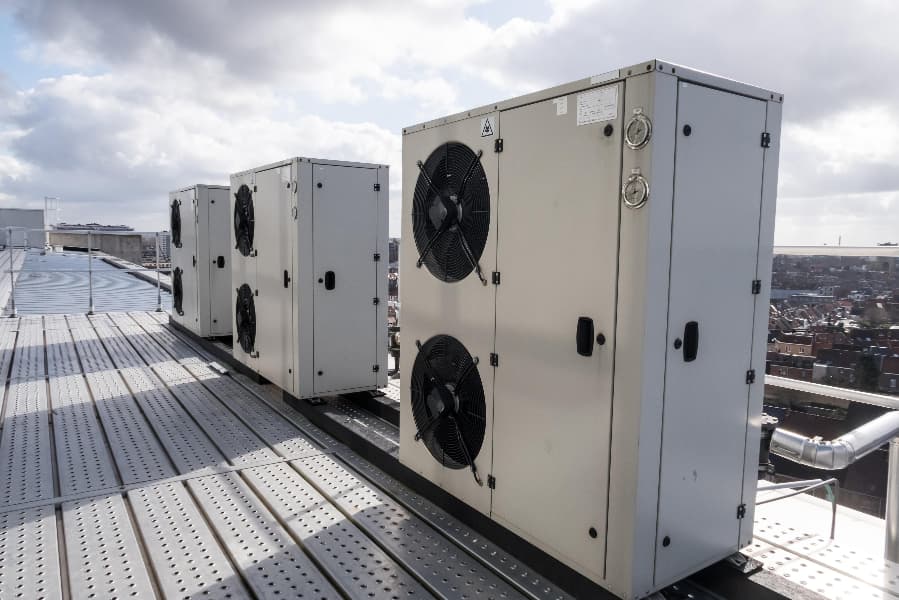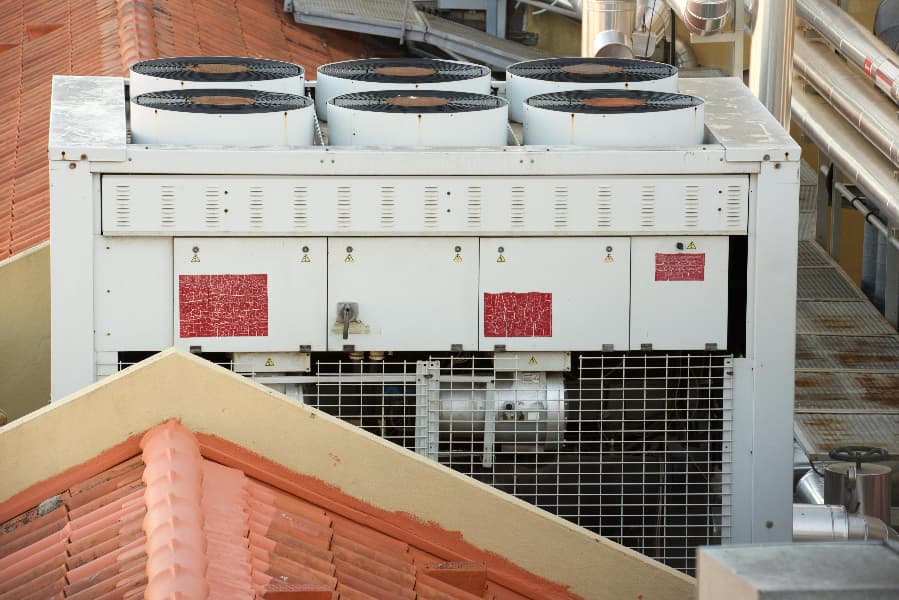- Ventilation
- Industrial ventilation
- Ventilation for industrial premises
- Ventilation of commercial premises
- Ventilation of medical facilities
- Clean rooms for medical facilities
- Air conditioning systems
- Industrial air conditioning systems
- Air conditioning of production facilities
- Aspiration
- Designing
- Installation of ventilation and air conditioning systems
- Supplier of ventilation and air conditioning equipment
ORDER A CALL
Industrial air conditioning systems - ensuring comfort and production efficiency

Indoor air quality affects not only your health but also your productivity. Industrial air conditioning systems can help improve air quality and provide a comfortable working environment. In this article, we will look at the benefits of using such systems, types and energy efficiency, as well as prevention and maintenance. We’ll also talk about innovative technologies in industrial air conditioning that are shaping the future of production. Let’s explore this topic together!
Indoor air quality: impact on health and productivity
Benefits of using industrial air conditioning systems
Types of industrial air conditioning systems
Energy efficiency of industrial air conditioning systems: saving money and the environment
Prevention and maintenance of industrial air conditioning systems
Innovative technologies in industrial air conditioning: the future of production
Indoor air quality: impact on health and productivity

Indoor air quality has a significant impact on human health and productivity. Poor air quality can lead to allergic reactions, respiratory diseases and other chronic illnesses. In addition, poor air quality can negatively impact worker productivity by reducing concentration and efficiency.
Industrial air conditioning systems can help improve indoor air quality. They provide optimal air temperature and humidity, and filter it from harmful substances. This allows for a comfortable living and working environment that promotes health and productivity.
However, it is important to remember that air quality depends not only on industrial air conditioning systems, but also on regular cleaning and ventilation of the premises. Therefore, to achieve maximum efficiency of industrial air conditioning systems, it is necessary to combine them with proper maintenance and hygiene.
Benefits of using industrial air conditioning systems
Industrial air conditioning systems are an indispensable element of the production process. They provide a comfortable environment for employees and help maintain product quality. The main advantage of using industrial air conditioning systems is the ability to control the temperature, humidity and purity of the air in the room.
In addition, industrial air conditioning reduces the amount of harmful substances in the air, which has a positive impact on human health. It also helps to prevent the spread of bacteria and other microorganisms that can cause disease.
Another advantage of industrial air conditioning systems is the ability to save money on heating and cooling. A properly configured system can reduce electricity and gas costs, which saves money and reduces the negative impact on the environment.
Types of industrial air conditioning systems
Industrial air conditioning systems are complex equipment that provide comfortable indoor conditions. They help maintain the optimum level of temperature, humidity and air purity. Depending on the needs of the client, there are different types of industrial air conditioning systems.
One of the most common types is a split system. It consists of two units: indoor and outdoor. The indoor unit is mounted inside the room, and the outdoor unit is mounted on the side of the house or office. This type of system is effective for heating and cooling small rooms.
For multi-storey buildings and large office spaces, a central air conditioning system is more suitable. It consists of one or more units that are located in a special room. This system allows you to maintain a stable temperature and humidity level throughout your home or office space.
Energy efficiency in industrial air conditioning: saving money and the environment
The energy efficiency of industrial air conditioning systems is one of the most important aspects to consider when using them. It not only saves money on energy costs, but also reduces the negative impact on the environment. A variety of technologies are now available to help ensure that air conditioning systems are as efficient as possible.
One of the ways to improve energy efficiency is to use special sensor systems that are equipped with industrial air conditioners. They allow you to automatically adjust the system’s power output depending on the number of people in the room, temperature conditions, etc. You can also use multi-stage control, which can reduce energy consumption by 30-40%.
Another way to improve energy efficiency is to use green air conditioning technology. It involves the use of natural resources to ensure an optimal indoor climate. For example, you can install systems that use solar energy or geothermal heating. This not only reduces the negative impact on the environment, but also significantly reduces energy costs.

Prevention and maintenance of industrial air conditioning systems
Prevention and maintenance of industrial air conditioning systems is an important step in ensuring indoor air quality. Regular maintenance helps to prevent possible breakdowns and maintain the functionality of the system for a long time. In addition, proper preventive maintenance helps to reduce energy consumption, which in turn leads to cost savings.
The main purpose of preventive maintenance is to prevent malfunctions in the air conditioning system. This is done by regularly checking the condition of all equipment, cleaning ventilation filters, checking the operation of the compressor and other system elements. You should also pay attention to the quality of the air supplied to the premises, so you need to check the operation of the air purification system.
Maintenance of industrial air conditioning systems should be carried out by qualified specialists, taking into account all the nuances. It is important to remember that improper maintenance can lead to serious consequences, such as accidents or air pollution in the premises. Therefore, you should follow the manufacturer’s recommendations and contact a professional for preventive maintenance.
Innovative technologies in industrial air conditioning: the future of production
Innovative technologies in industrial air conditioning are a key factor in improving indoor air quality and ensuring comfortable working conditions. One of the most promising innovations is the use of modern air purification systems that effectively filter harmful or unwanted substances from the air. This is especially important for industrial areas where there may be visible or invisible sources of pollution.
Another innovative technology is the use of smart control of air conditioning systems. Thanks to modern temperature, humidity and air quality sensors, the system can automatically adjust air conditioning parameters to achieve optimum comfort and energy efficiency. This helps to reduce energy costs and reduce the negative impact on the environment.
One of the most promising areas for the development of industrial air conditioning systems is the use of alternative energy sources, such as solar or geothermal. Not only does this provide a sustainable and environmentally friendly energy base for air conditioning systems, but it can also significantly reduce the cost of heating and cooling. This approach is particularly relevant in regions with a high risk of energy crises and limited resources.
PROFESSIONAL SERVICES
THE WORLD OF VENTILATION EQUIPMENT
We create customized solutions that meet the needs of each client
